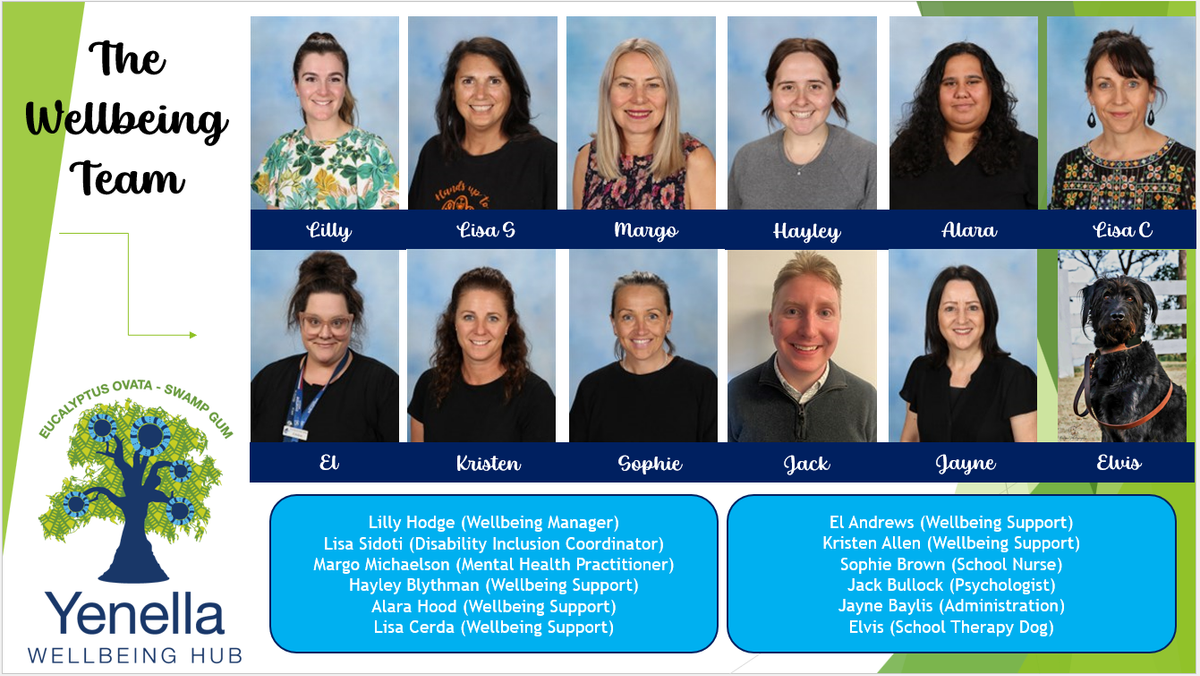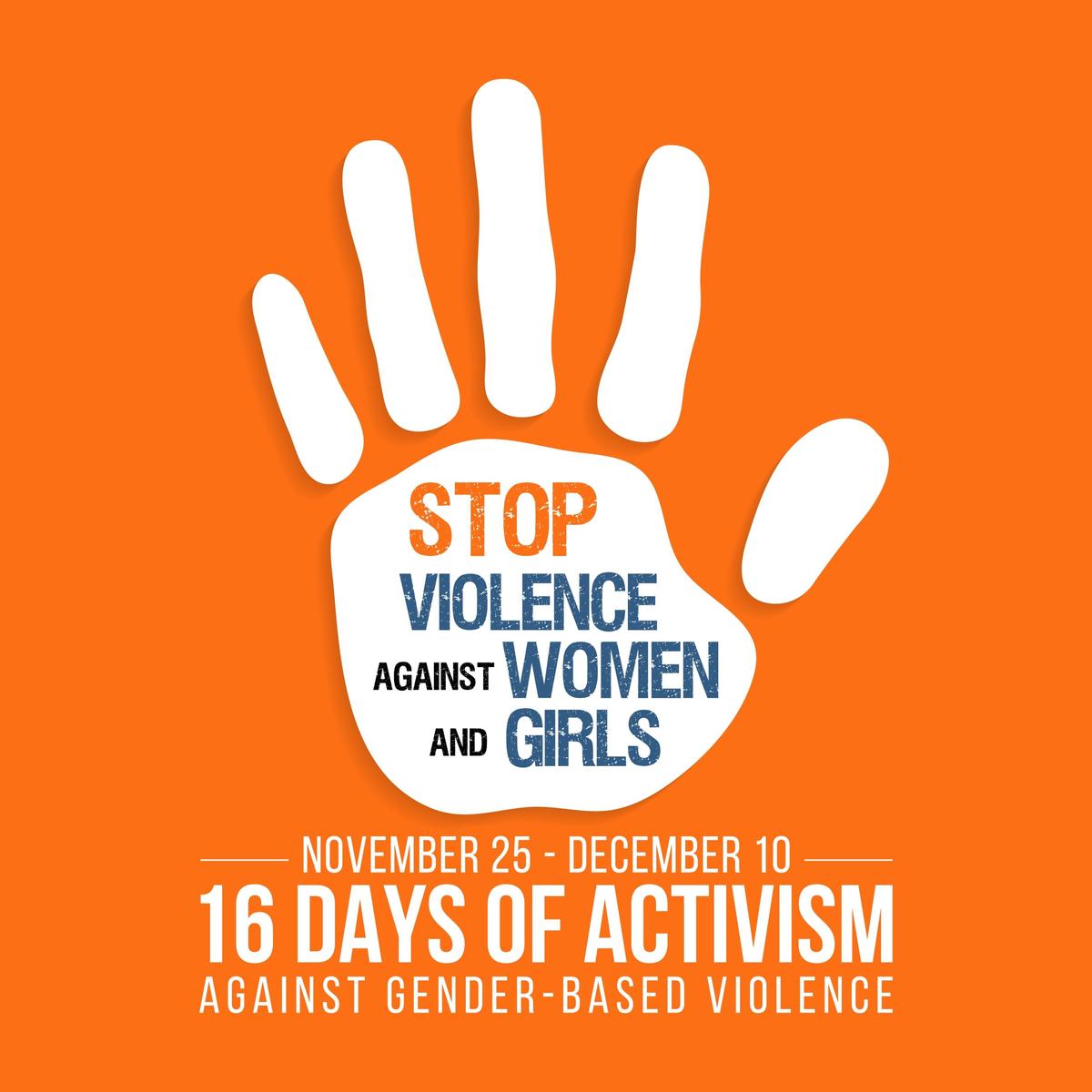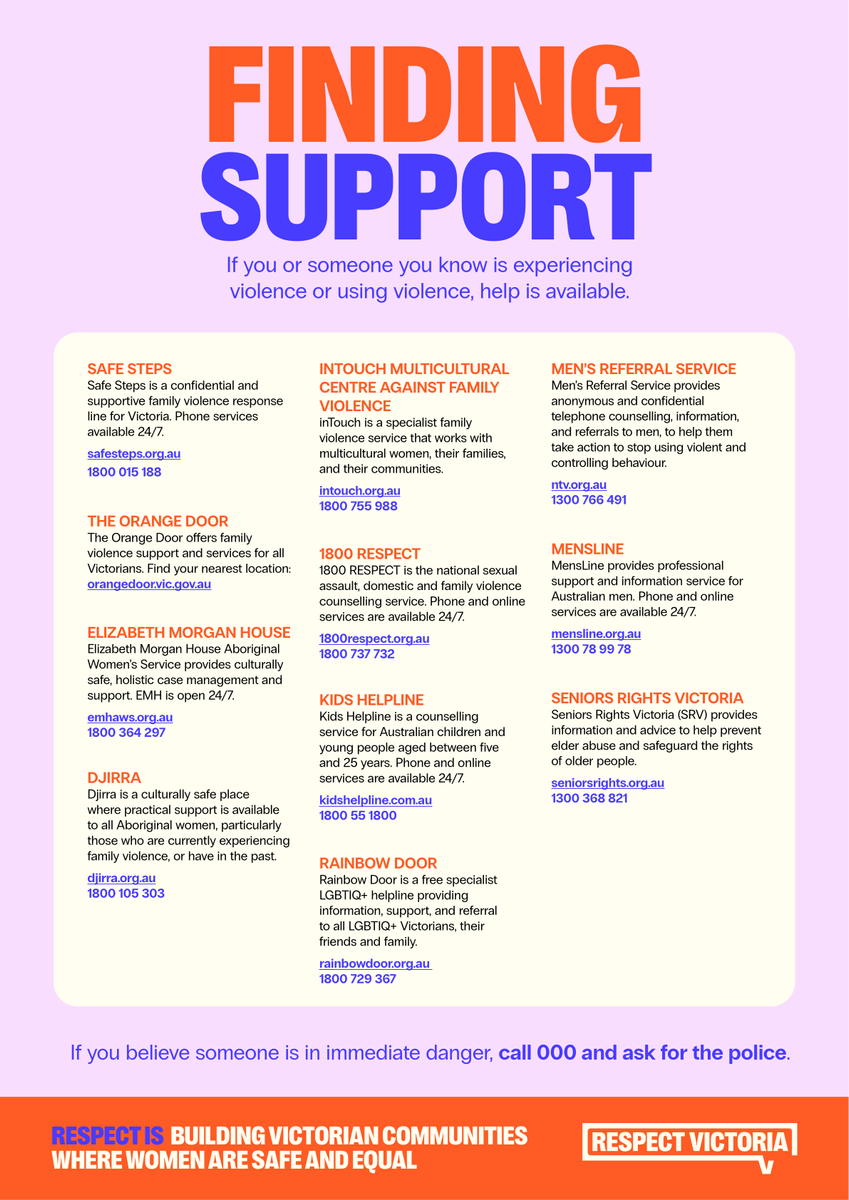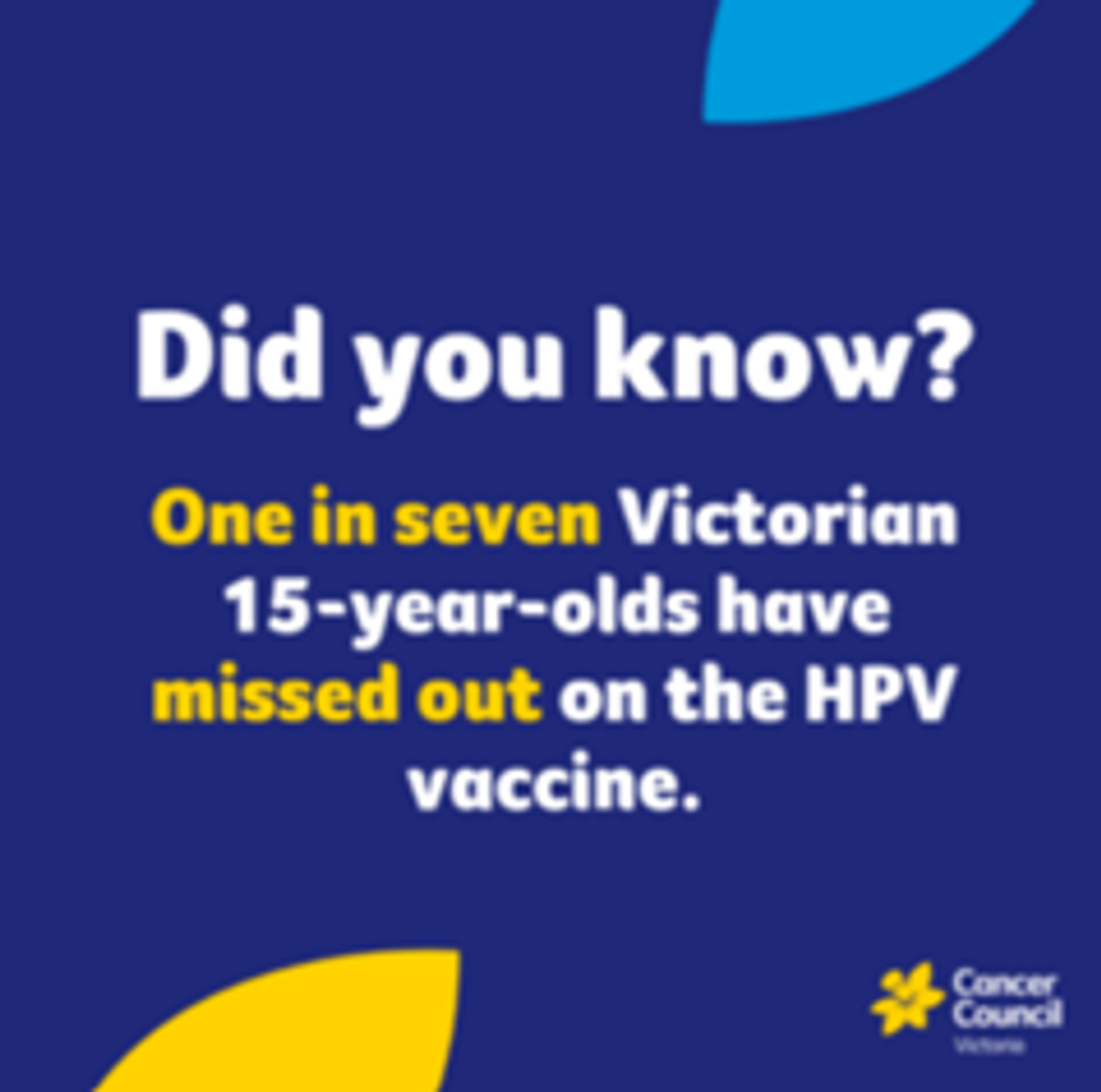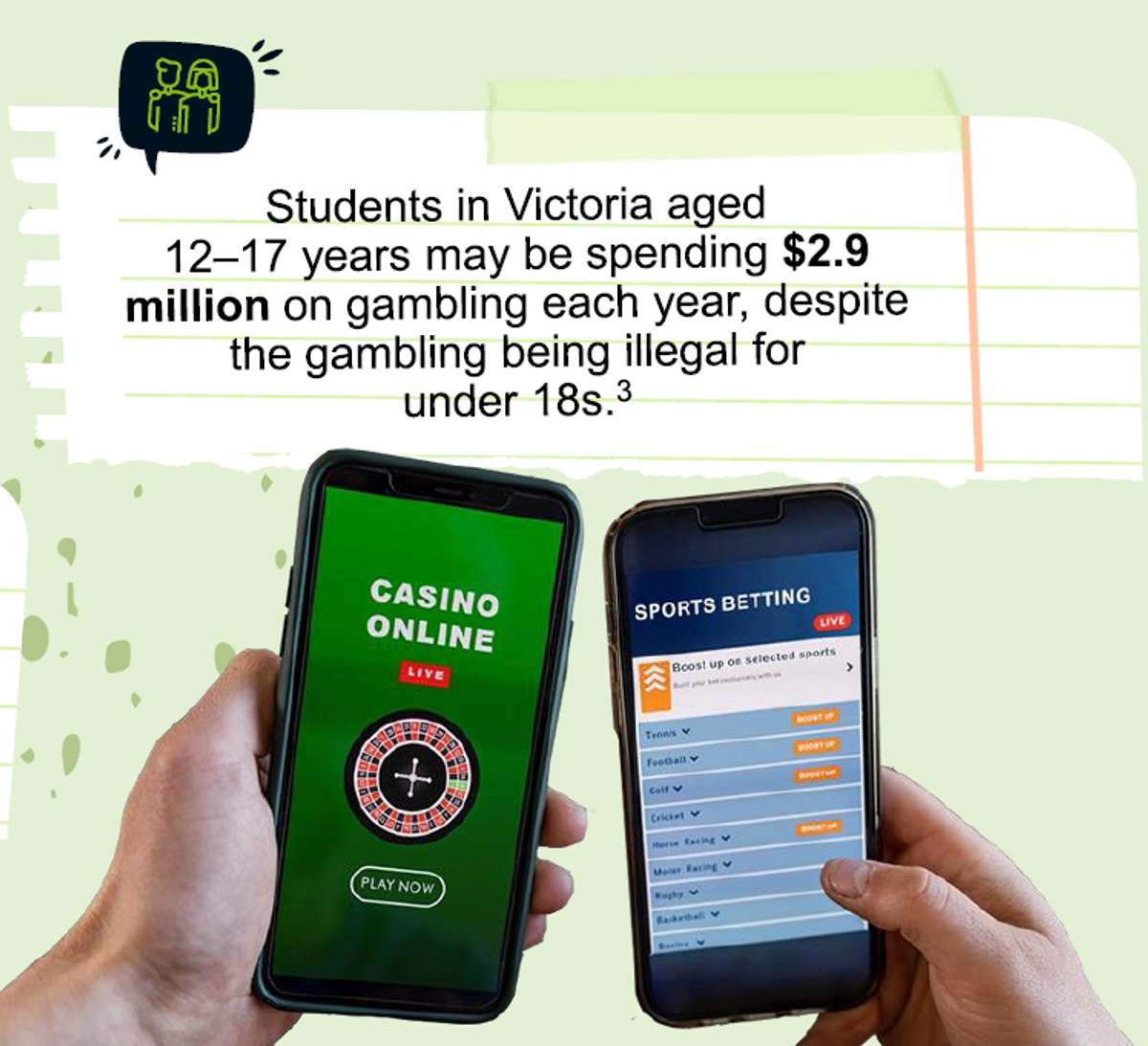Wellbeing
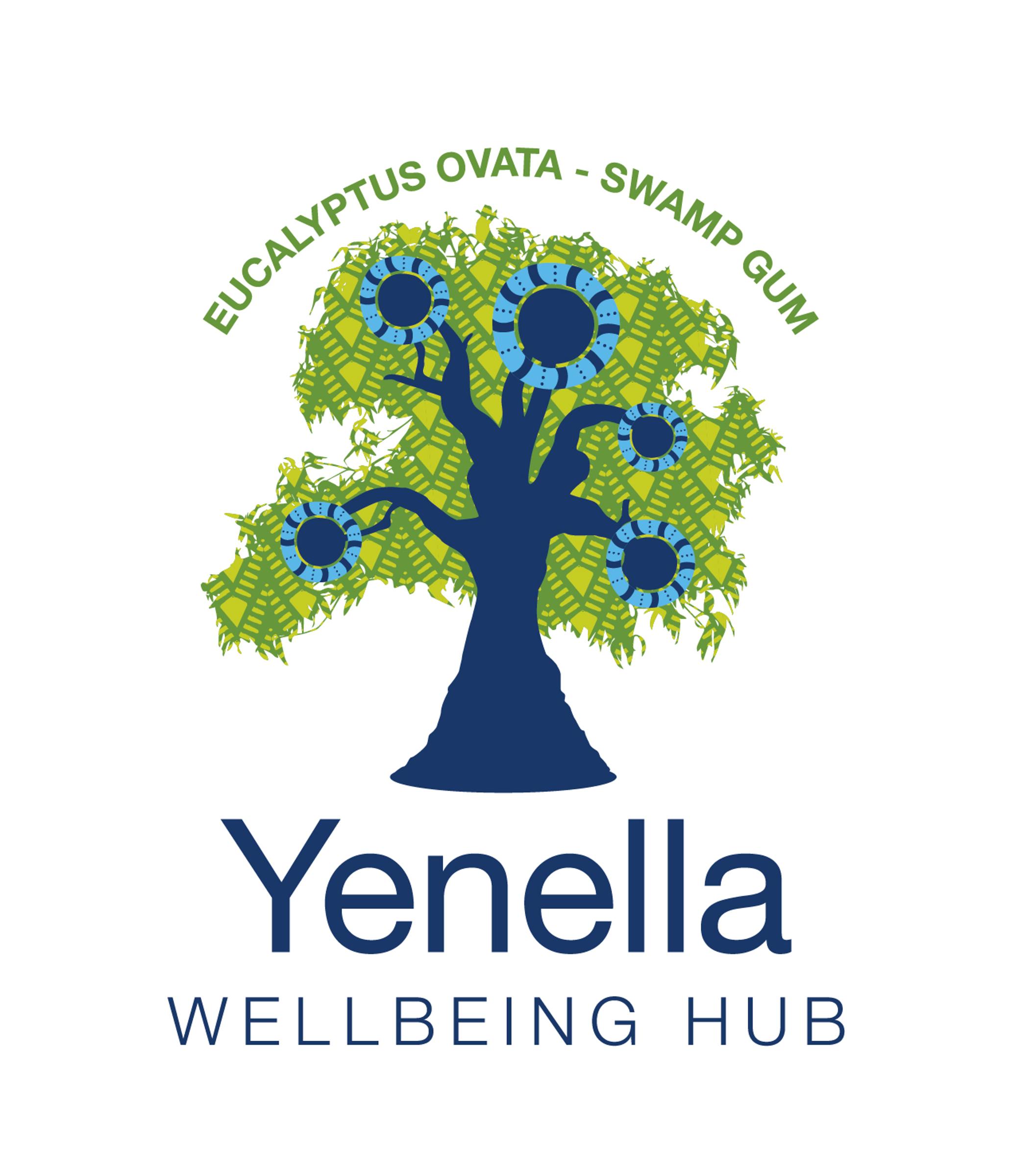
This widely recognised global campaign runs from 25th November to 10th December raising awareness and encouraging action to end gender-based violence. Primary prevention of violence is about changing the underlying social conditions that produce and drive this violence, that excuse, justify or even promote it – that is, challenging the gendered drivers of men’s violence. Violence against women is preventable if we change the culture that allows it to happen.
Key Dates:
25 November: International Day for the Elimination of Violence Against Women
3 December: International Day of People with Disabilities
10 December: International Human Rights Day
What is gender-based violence? This includes all forms of violence against people based on their gender, or violence that affects people of a particular gender disproportionately. It is commonly used to describe men’s violence against women and girls. Violence against LGBTIQA+ communities based on gender or gender norms is also a form of gender-based violence. Men and boys can also be targeted by violence due to their gender, or because they do not conform to gender norms.
Challenging gender stereotypes: Gender stereotypes are beliefs and assumptions about the characteristics that are considered innate or appropriate for women and men, girls and boys. Gender stereotyping is when we apply and reinforce these assumptions. Research shows that the pressure on men to follow outdated stereotypes of masculinity is contributing to their anxiety, depression, risky drinking and violence against women. Encouragingly, most people support the idea that everyone will benefit if men can break free from harmful gender stereotypes.
How disrespect can lead to violence against women: Research tells us that sexism and disrespect towards women contribute to a culture that allows, justifies, or even promotes violence towards women. Challenging disrespect towards women is everyone's responsibility. By calling out disrespect, sexism and other forms of discrimination early, we can help prevent violence against women and take steps towards a future where we are all safe, equal and respected.
Championing equality in sport: Equality in sport refers to the fair and just treatment of all individuals, regardless of their gender, race, ethnicity, sexual orientation, ability, or any other characteristic. It encompasses the idea that everyone should have equal opportunities, access, and treatment within the sporting environment and is one of the most powerful platforms for promoting gender equality. We all have an opportunity to use sport – playing, watching, and learning about it – to:
- break free of stereotypes that harm women and girls
- create an even playing field for future players and fans
- challenge outdated ideas about men and masculinity
- foster safe, inclusive communities on and off the field.
Housework and harmful gender stereotyping: The assumption that women are responsible for housework and care tasks – and the opposite assumption that men aren’t good at or interested in them – is one of the most widespread examples of rigid gender stereotyping in Australia today. It’s not just an assumption on an individual household level, either – it includes broader things in society like the way cleaning products are marketed, the kinds of work we do outside the home, which parent the school calls when a child is sick, the types of content the algorithm shows us on social media, the expectations we have for what skills our children should learn, and more.Even in relationships and households where everyone contributes to physical housework, many women feel the pressure of the “mental load” – the planning, organising, noticing and anticipating associated with managing households and families. All the background of daily life like coordinating children’s academic, extracurricular and social lives, or logistics of cultural holidays, or making sure there’s enough toilet paper, or being the one who knows where spare batteries are. These are things that aren’t always as obvious, but they can tip the load. None of these need to be the burden of one person – yet it’s the reality for many households
16 ways you can call out sexism and disrespect:
1. Don't laugh at sexist jokes.
2. Give a disapproving look to show a behaviour or statement is not okay. Shake your head or roll your eyes.
3. Leave a pointed and uncomfortable silence.
4. Make a light-hearted comment: "What century are you living in?"
5. Check in with the person affected: "I heard what he just said – are you okay?"
6. Privately let them know their behaviour is not okay: "The joke you made in yesterday's meeting was not funny, and actually not okay."
7. Calmly disagree and state that the comment is wrong or unacceptable: "I know you probably didn't mean it, but I found what you said to be offensive."
8. Speak up and educate by explaining why you disagree: "Actually evidence shows the vast majority of women do not make up false claims of sexual assault."
9. Challenge the logic: "That's not my experience" or "What makes you think that?”
10. Stand up for the person affected: "Michelle was saying something, and you cut her off again."
11. Make eye contact with the person affected – let them know you're an ally.
12. Show your emotion: "It actually makes me sad / uncomfortable when you say that."
13. Support others when they call it out: "I agree, that's not funny."
14. Appeal to their better self: "Come on, you're better than that."
15. Report the behaviour to management, or via incident reporting systems if available.
16 Disrupt or distract the situation to redirect the focus from the incident to someone else.
There is no 'right' way to call it out, but we do have a few tips you might want to try. Don't forget to put your own safety first - if a situation is already violent or looks like it could turn that way, always call triple 000.
16 STATISTICS
41% of Australians believe that domestic violence is committed equally by both men and women, despite evidence definitively showing that men are the primary perpetrators of domestic violence.
1 in 4 Australian youth have experienced child sexual abuse before age 18
3 in 5 LGBTIQA+ people have experienced intimate partner violence
1 in 4 Australians believe a woman who doesn’t leave an abusive partner is responsible for the abuse continuing
11% of Australians think men should take control in relationships and be the head of the household
35% of Australians believe it is common for sexual assault accusations to be used as a way of getting back at men
1 in 10 Australians think men make more capable bosses than women at work
1 in 5 Australians believe women prefer a man to be in charge in a relationship
15% of Australians think it's okay for men to make sexist jokes about women in front of their male friends
21% of Australians believe if a woman sends a naked picture to her partner, she is partly responsible if he shares it without her permission
35% of Australians think women exaggerate how unequally they are treated
95% of all victims (regardless of gender) experience violence from a male perpetrator
20% of surveyed young people in Australia reported using violence in the home
1 in 14 men have experienced intimate partner violence since the age of 15
64% of people with disability have experienced violence since the age of 15
2 in 5 people living in Australian aged care facilities experience elder abuse
Cervical Cancer Awareness Week is from 10 -16 November 2024
is run by the Australian Cervical Cancer Foundation and this year, the theme is:
1+ 5 = Cervical cancer protection, which means:
- 1 dose of HPV vaccine for healthy young people; plus
- Cervical screening every 5 years for women and people with a cervix from 25–74 yrs
HPV vaccination for teenagers 2 min video
Why does my child need this vaccination before they are sexually active?
- The vaccine is most effective if given before young people (male and female) are sexually active
- It is given free at school to students aged 12-13 years as young people have a better immune response to the vaccine.
Cancer Council HPV Information sheet below:
https://acrobat.adobe.com/link/review?uri=urn:aaid:scds:US:4c2b93eb-8572-3556-9abb-e5d390ca773e
- The HPV vaccine protects against nine types of HPV that cause most cervical cancers, other HPV related cancers in males and females and almost all cases of genital warts.
- HPV stands for human papillomavirus. It is a common sexually transmitted infection that spreads through genital skin to skin contact between people of any gender.
- HPV usually causes no symptoms and goes away by itself; however, it can sometimes cause serious diseases including cancer.
- In Australia, the HPV vaccine is free and recommended for people aged 12 to 25, under the National Immunisation Program.
- Australians aged 25 and under who missed out on the HPV vaccine at school, can catch up for free through their doctor, local council immunisation service or at some pharmacies.
- Australians who are 26 or older or not eligible for Medicare, may need to pay for the vaccine.
- The HPV vaccine is safe, effective and can protect you against HPV-related cancers and diseases in the future.
Cancer Council Victoria has launched a campaign encouraging young Victorians who have missed getting the HPV vaccine in school to catch up as soon as possible through their doctor or local council immunisation service. See below link to our local schedule: 6595ffe0673f462e2fc91572_Immunisation DL Brochure 2024.pdf - Local East Gippsland Shire Nurse Immunisation schedule 2024
GAMBLING AND YOUNG PEOPLE
Be Ahead of the Game: a school education program about gambling and gaming
The Be Ahead of the Game school education program offers:
- Free 1-hour information sessions for students, parents and teachers
- Free curriculum-aligned teaching resources for upper primary to senior secondary students
- Gambling policy template for schools
- Articles for school newsletters
- Information and resources for parents and carers to support young people.

